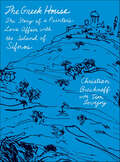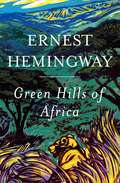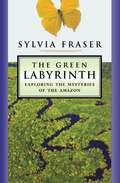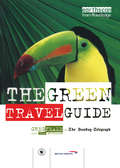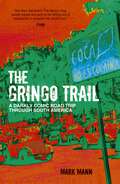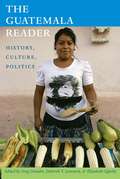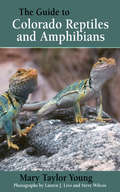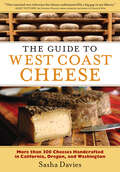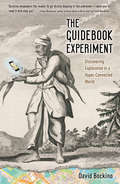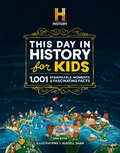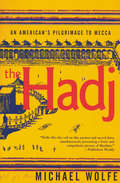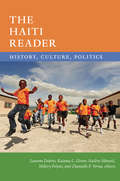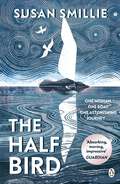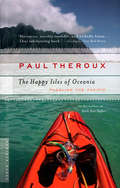- Table View
- List View
The Greek House: The Story of a Painter's Love Affair with the Island of Sifnos
by Christian Brechneff Tim LovejoyA richly rewarding narrative about a young painter's love affair with the Greek island of SifnosWhen Christian Brechneff first set foot on the Greek island of Sifnos, it was the spring of 1972 and he was a twenty-one-year-old painter searching for artistic inspiration and a quiet place to work. There, this Swiss child of Russian émigrés, adrift and confused about his sexuality, found something extraordinary. In Sifnos, he found a muse, a subject he was to paint for years, and a sanctuary. In The Greek House, Brechneff tells a funny, touching narrative about his relationship to Sifnos, writing with warmth about its unforgettable residents and the house he bought in a hilltop farm village. This is the story of how he fell in love with Greece, and how it became a haven from the complexities of his life in Western Europe and New York. It is the story of his village and of the island during the thirty-odd years he owned the house—from a time when there were barely any roads, to the arrival of the modern world with its tourists and high-speed boats and the euro. And it is the story of the end of the love affair—how the island changed and he changed, how he discovered he had outgrown Sifnos, or couldn't grow there anymore.The Greek House is a celebration of place and an honest narrative of self-discovery. In its pages, a naïve and inexperienced young man comes into his own. Weaving himself into the life of the island, painting it year after year, he finds a place he can call home.
The Green Edit: Easy tips for the eco-friendly traveller
by Juliet KinsmanExplore the world and satisfy your wanderlust in the most eco-friendly way.How can we lessen our impact on the world without giving up the things we love? This series of easy-to-follow guides show that positive change is possible without radical changes to your everyday life.Sustainable tourism doesn’t have to mean vowing to never take another flight or spending holidays camping in your back garden. This short expert guide from eco-travel journalist Juliet Kinsman, takes you through every step of planning your trip, from booking to boarding, and arms you with everything you need to know for a lower-impact getaway.Whether it's explaining how to know which plane to take (yes, some are greener than others) or how to avoid the mini toiletries trap; this book shows that you can save the planet and still live life to the full.
The Green Hills of Africa [Bulgarian]
by Ernest HemingwayHis second major venture into nonfiction (after Death in the Afternoon, 1932), Green Hills of Africa is Ernest Hemingway's lyrical journal of a month on safari in the great game country of East Africa, where he and his wife Pauline journeyed in December of 1933. Hemingway's well-known interest in--and fascination with--big-game hunting is magnificently captured in this evocative account of his trip. In examining the poetic grace of the chase, and the ferocity of the kill, Hemingway also looks inward, seeking to explain the lure of the hunt and the primal undercurrent that comes alive on the plains of Africa. Yet Green Hills of Africa is also an impassioned portrait of the glory of the African landscape, and of the beauty of a wilderness that was, even then, being threatened by the incursions of man. Hemingway's rich description of the beauty and strangeness of the land and his passion for the sport of hunting combine to give Green Hills of Africa the freshness and immediacy of a deeply felt personal experience that is the hallmark of the greatest travel writing. [This edition is in Bulgarian.]
The Green Labyrinth: Exploring the Mysteries of the Amazon
by Sylvia FraserLimited time offer. In the critically acclaimed The Rope in the Water, Sylvia Fraser described her three-month pilgrimage to India in search of "something larger than myself, something deeper, something more." In The Green Labyrinth, Fraser continues her journey, this time deep into the jungle of the Amazon in the company of shamans, traditional spiritualists practicing ancient rituals. At the heart of Fraser’s quest lies the mind-expanding drug "ayahuasca", a gateway to worlds beyond her own, to a better understanding of the mysteries of existence. Fraser takes us to shamanic sanctuaries that hover at the edge of our modern world, providing a portal to the unknown. Along the way she introduces us to a diverse group of pilgrims searching for their own answers with the help of shamans and ayahuasca. Through meaningful visions and with spiritual guidance, Fraser and her fellow travellers acquire insight into their emotional and psychic lives, and discover that many of the answers they are searching for lie within themselves.
The Green Travel Guide
by Greg NealeThis book suggests ways in which we can enjoy our holidays and our travel even more: by becoming green travellers. It also suggests different types of green holidays and encourages some of the better examples of good environmental practice in holidaymaking around the world.
The Gringo Trail: A Darkly Comic Road Trip through South America
by Mark MannMark Mann and his girlfriend Melissa set off to explore the ancient monuments, mountains and rainforests of South America. But for their friend Mark, South America meant only one thing: drugs. Sad, funny and shocking, The Gringo Trail is a darkly comic road-trip and a revealing journey through South America’s turbulent history.
The Grown-Up's Guide to Running Away from Home: Making a New Life Abroad
by Rosanne KnorrFor empty-nesters, early retirees, and even established executives, midlife is the ideal time to turn travel fantasies into real and rewarding experiences. This second edition of THE GROWN-UP'S GUIDE covers estimating cost-of-living expenses, the dos and don'ts of international health care, the boom in online travel resources, and much more. Whether planning a monthlong escape or a whole new life in another country, this empowering guide will encourage mature would-be expats to pursue the overseas adventure they've been craving. An accessible primer for midlife adults who long to live or retire in another country, featuring information on choosing a destination, readying finances, working, and keeping the stateside home fires burning. Detailed advice is interspersed with lively and inspiring anecdotes from the author's own adventures, plus interviews with other experienced expats. From the Trade Paperback edition.
The Growth Strategies of Hotel Chains: Best Business Practices by Leading Companies
by Kaye Sung ChonHow did Accor, Cendant, Choice Hotels International, Marriott, and Hilton become the largest hotel chains in the world-and what strategies will they use to continue their growth?This first-of-its-kind textbook presents a balanced overview of the theory and practice of hotel chains&’ growth strategies. It explains in-depth how
The Guam Guide: What To See And Do On The Island
by Dave Lotz Johathan LotzA traveler's guide to Guam. Includes historical sites to visit, recreational activities, and some cultural history of the island.
The Guatemala Reader: History, Culture, Politics
by Greg Grandin Deborah T. Levenson Elizabeth OglesbyThis reader brings together more than 200 texts and images in a broad introduction to Guatemala's history, culture, and politics. In choosing the selections, the editors sought to avoid representing the country only in terms of its long experience of conflict, racism, and violence. And so, while offering many perspectives on that violence, this anthology portrays Guatemala as a real place where people experience joys and sorrows that cannot be reduced to the contretemps of resistance and repression. It includes not only the opinions of politicians, activists, and scholars, but also poems, songs, plays, jokes, novels, short stories, recipes, art, and photographs that capture the diversity of everyday life in Guatemala. The editors introduce all of the selections, from the first piece, an excerpt from the Popol Vuh, a mid-sixteenth-century text believed to be the single most important source documenting pre-Hispanic Maya culture, through the final selections, which explore contemporary Guatemala in relation to neoliberalism, multiculturalism, and the dynamics of migration to the United States and of immigrant life. Many pieces were originally published in Spanish, and most of those appear in English for the first time.
The Guide to Colorado Reptiles and Amphibians
by Steve Wilcox Mary Taylor Young Lauren J. LivoNature writer Mary Taylor Young's latest field guide will help you discover and learn more about Colorado's native reptiles and amphibians. Covering seventy-two species of turtles, toads, salamanders, snakes, and lizards, The Guide to Colorado Reptiles and Amphibians explores herptiles through detailed descriptions and informative sidebars. Includes full-color photographs, range maps, species' descriptions, a checklist, and a glossary.Award-winning nature writer Mary Taylor Young's love of the outdoors led to a degree in zoology from Colorado State University. She has written nine books and hundreds of magazine and journal articles, and she works extensively with state and federal wildlife agencies.
The Guide to West Coast Cheese: More than 300 Cheeses Handcrafted in California, Oregon, and Washington
by Sasha DaviesA robust sheep’s milk cheese studded with whole peppercorns. A sharp, clothbound Cheddar that pairs perfectly with a nutty brown ale and a dollop of mango chutney. A tangy, nettle-wrapped cheese made in celebration of the cows returning to pasture in early spring. A light and cakey goat cheese with notes of pine nuts and Meyer lemons. These are just a few of the hundreds of delicious cheeses with origins up and down the West Coast that Sasha Davies chronicles in her detailed exploration of this exciting cheese region.From just-emerging, small-scale cheeses to those that have earned international recognition, the spotlight is on the vibrant hues, bold aromas, and surprising yet palate-pleasing flavors that make these cheeses so unique. Rich with information, this accessible guide examines the key factors that influence the distinctive character of every cheese, and includes beverage pairing ideas, serving suggestions, and fascinating features on cheesemaking and individual producers.Whether at the market, your local cheese shop, or while traveling, this is the ultimate reference for selecting, identifying, and savoring the cheeses of California, Oregon, and Washington.
The Guidebook Experiment
by David BockinoOur information-obsessed world has fundamentally altered much of what we do on a day-to-day basis. The way we shop. The way we communicate. The way we learn.More tools tell us how to spend our free time than ever before, telling us not only where to go but how to get there, what it will look like, and why we should go in the first place. This proliferation of guidebook material, this "guidebook evolution," has clearly changed the way we travel. But how?By tracing the evolution of the guidebook, from pilgrim manuals and Baedeker's to Yelp reviews and Google Maps, and by identifying the three pillars of the guidebook structure, The Guidebook Experiment explores the effects this growth has had on the state of the genre.Then, by using some of the world's greatest explorers as inspiration, the author sets out guidebook-less, launching an experiment that determines how the guidebook has fundamentally altered the nature of travel and explaining why all travelers should consider conducting their own guidebook experiments.The Guidebook Experiment, a call-to-action disguised as a nonfiction narrative, capitalizes on the recent trend to "disconnect" and encourages readers to discover the joy of travel on their own.
The HISTORY Channel This Day in History For Kids: 1001 Remarkable Moments and Fascinating Facts
by Dan BovaAn exciting, visual adventure through history with day-by-day accounts of extraordinary events, notable people, and incredible inventions for kids ages 8-12.History comes alive in this beautifully illustrated book with bite-size facts (along with a touch of humor) that will engage and entertain young curious minds. Jam-packed with important events, inspiring accomplishments by remarkable people, and groundbreaking inventions, this super-fun fact-filled book, the first kids book from History Channel, includes the most interesting historical facts--from early civilization up to the 21st century all around the world for every day of the year. Each day&’s entry includes multiple events that occurred on that day in history along with charming original illustrations and photography. Plus, readers are prompted to recall their own remarkable milestones, helping them to consider their place in history. Inside, kids will discover:Historic events that happened on their birthdayMajor moments in sportsGroundbreaking events and famous military battlesFearless explorers, inventors and freedom fightersRecord-breaking stuntsWeird and wacky holidaysIncredible dinosaur discoveries, and much more!A great gift for an up-and-coming history buff and an engaging resource for the classroom, this book offers a fresh twist on history, looking into the past and letting you recall your own.
The Hadj: An American's Pilgrimage to Mecca
by Michael WolfeThe Hadj, or sacred journey, is the pilgrimage to the house of God at Mecca that all Muslims are asked to make once in their lifetimes. One of the world’s longest-lived religious rites, having continued without break for fourteen hundred years, it is, like all things Islamic, shrouded in mystery for Westerners. In The Hadj, Michael Wolfe, an American who converted to Islam, recounts his own journey a pilgrim, and in doing so brings readers close to the heart of what the pilgrimage means to a member of the religion that claims one-sixth of the world’s population. Not since Sir Richard Burton’s account of the pilgrimage to Mecca over one hundred years ago has a Western writer described the Hadj in such fascinating detail.
The Hairy Hikers: A Coast-to-Coast Trek Along the French Pyrenees
by David Le VayFuelled by a mid-life crisis and the need to escape modern life, David and Rob set out to walk from the Atlantic to the Mediterranean. This humorous and often poignant account of their coast-to-coast trek along the French Pyrenees, reveals the history and geography along the way and will appeal to all walkers and admirers of human endeavour.
The Hairy Hikers: A Coast-to-Coast Trek Along the French Pyrenees
by David Le VayFuelled by a mid-life crisis and the need to escape modern life, David and Rob set out to walk from the Atlantic to the Mediterranean. This humorous and often poignant account of their coast-to-coast trek along the French Pyrenees, reveals the history and geography along the way and will appeal to all walkers and admirers of human endeavour.
The Haiti Reader: History, Culture, Politics (The Latin America Readers)
by Laurent Dubois et al.While Haiti established the second independent nation in the Western Hemisphere and was the first black country to gain independence from European colonizers, its history is not well known in the Anglophone world. The Haiti Reader introduces readers to Haiti's dynamic history and culture from the viewpoint of Haitians from all walks of life. Its dozens of selections—most of which appear here in English for the first time—are representative of Haiti's scholarly, literary, religious, visual, musical, and political cultures, and range from poems, novels, and political tracts to essays, legislation, songs, and folk tales. Spanning the centuries between pre-contact indigenous Haiti to the aftermath of the 2010 earthquake, the Reader covers widely known episodes in Haiti's history, such as the U.S. military occupation and the Duvalier dictatorship, as well as overlooked periods such as the decades immediately following Haiti's &“second independence&” in 1934. Whether examining issues of political upheaval, the environment, or modernization, The Haiti Reader provides an unparalleled look at Haiti's history, culture, and politics.
The Half Bird: An inspiring true story of adventure, solitude, and soul-searching on the ocean
by Susan SmillieDiscover one woman's solo journey from Land’s End to Greece, embracing solitude, self-discovery, and resilience'A lesson on how to live, how to heal, how to grow and how to fly’ - Gordan Buchanan–'We have no idea how much resilience there is inside us until we have to draw on it. We learn that we grow through adversity only as we go through it. That we crave happiness like plants leaning toward the light'In 2016, Susan Smillie quit her job to sail round the British Isles aboard her beloved yacht Isean. Yet when it came to rounding the tip of Cornwall, she unexpectedly headed south, leaving home in her wake.Over the next three years she sailed the continent, living with only the basics she had aboard, by her wits, and via the kindness of the people and beauty of the coasts she encountered.But Susan’s travels were just the beginning of her spiritual journey. Could she make the wild, unruly sea her home?–Praise for The Half Bird'A beautiful, wise and open-hearted odyssey through life, loves and the sea' Patrick Barkham, author of The Butterfly Isles'I didn't know a love song between a woman and her boat could transport, and transfix me. The Half Bird made my heart whole' Rhik Samadder, author of I Never Said I Loved You'It’s hard to read The Half Bird without wondering whether you could do it too. It may be better to start by pondering Smillie’s wider message – that to work out what will truly make you happy, you first need to stop and smell the air around you' Guardian'Told with all the invigorating energy of a crisp wind under a cloudless sky' Charlotte Higgins, Chief culture writer, Guardian‘Smillie finds a freedom, beauty, and joy in amongst the rolling waves and shifting tides of loss, illness, and grief. The Half Bird is an immensely enjoyable ocean adventure, but what emerges is a deeply inspiring story about the quiet strengths that reside within us all’ Will Millard
The Happiest Man in the World
by Alec WilkinsonPoppa Neutrino has been a vagabond his whole life. He has improvised an existence far outside the boundaries of what most of us consider to be normality. He has been a successful street musician, a San Francisco beatnik, a raft man in the tradition of Thor Heyerdahl, and a football enthusiast who believes he has invented a foolproof offensive play. He may be right - we have to wait and see. Alec Wilkinson has spent the last few years of his life following the erratic trail and exploits of Poppa Neutr...
The Happy Ant-Heap: And Other Pieces
by Norman LewisExperience the far reaches of the world in this eclectic collection of travel essays by acclaimed writer Norman LewisThe Happy Ant-Heap is Norman Lewis&’s powerful and stylish collection of decades&’ worth of travel writing. Lewis&’s deft social commentary captures life from all corners of the world—from the tales of a Cuban fighter pilot to the courtroom trial of the all-powerful Sicilian Mafia, and from oyster divers in Yemen to a flirtation with a possible murderess in Greece. Featuring some of his most remarkable adventures, The Happy Ant-Heap is a whirlwind tour around the globe from a writer at the pinnacle of his craft.
The Happy Isles of Oceania: Paddling the Pacific
by Paul TherouxThe author of The Great Railway Bazaar explores the South Pacific by kayak: &“This exhilarating epic ranks with [his] best travel books&” (Publishers Weekly). In one of his most exotic and adventuresome journeys, travel writer Paul Theroux embarks on an eighteen-month tour of the South Pacific, exploring fifty-one islands by collapsible kayak. Beginning in New Zealand's rain forests and ultimately coming to shore thousands of miles away in Hawaii, Theroux paddles alone over isolated atolls, through dirty harbors and shark-filled waters, and along treacherous coastlines. Along the way, Theroux meets the king of Tonga, encounters street gangs in Auckland, and investigates a cargo cult in Vanuatu. From Australia to Tahiti, Fiji, Easter Island, and beyond, this exhilarating tropical epic is full of disarming observations and high adventure.
The Happy Nomad: Live with less and find what really matters
by Charlotte Bradman'Extraordinary . . . a glimpse into a future of endless possibility.'- Martin Dorey, travel writerA truly inspirational memoir for anyone who dreams of leading a different life.Vivid, self-confessional and darkly humorous, The Happy Nomad is the story of how Charlotte Bradman breaks free from her turbulent past, mounting debts and the nine-to-five treadmill, and finds a simpler way of life living full-time in her beloved campervan. Freed from the burden of a thirty-year-old boiler on the edge, temperamental ceilings that don't like heights, and letterboxes that mercilessly allow bills and arrest warrants through, Charlotte finds joy in a life lived closer to nature. Stripped back to the very basics, no longer weighed down by material possessions, she discovers the precious gift of time, enabling her to connect with both herself and the people she meets, and to re-evaluate what it truly means to thrive.The Happy Nomad is a gripping account of how one woman lost her house and found peace and contentment in her campervan home.'Proof that water in the form of driving rain, wild river, icy lake, or turquoise ocean can build back a body, mend a tattered mind, heal a broken heart, and soothe a weary soul.'- Dr Wallace J Nichols, marine biologist and author of Blue Mind
The Happy Nomad: Live with less and find what really matters
by Charlotte Bradman'Extraordinary . . . a glimpse into a future of endless possibility.'- Martin Dorey, travel writerA truly inspirational memoir for anyone who dreams of leading a different life.Vivid, self-confessional and darkly humorous, The Happy Nomad is the story of how Charlotte Bradman breaks free from her turbulent past, mounting debts and the nine-to-five treadmill, and finds a simpler way of life living full-time in her beloved campervan. Freed from the burden of a thirty-year-old boiler on the edge, temperamental ceilings that don't like heights, and letterboxes that mercilessly allow bills and arrest warrants through, Charlotte finds joy in a life lived closer to nature. Stripped back to the very basics, no longer weighed down by material possessions, she discovers the precious gift of time, enabling her to connect with both herself and the people she meets, and to re-evaluate what it truly means to thrive.The Happy Nomad is a gripping account of how one woman lost her house and found peace and contentment in her campervan home.'Proof that water in the form of driving rain, wild river, icy lake, or turquoise ocean can build back a body, mend a tattered mind, heal a broken heart, and soothe a weary soul.'- Dr Wallace J Nichols, marine biologist and author of Blue Mind
The Happy Nomad: Live with less and find what really matters
by Charlotte Bradman'Extraordinary . . . a glimpse into a future of endless possibility.'- Martin Dorey, travel writerA truly inspirational memoir for anyone who dreams of leading a different life.Vivid, self-confessional and darkly humorous, The Happy Nomad is the story of how Charlotte Bradman breaks free from her turbulent past, mounting debts and the nine-to-five treadmill, and finds a simpler way of life living full-time in her beloved campervan. Freed from the burden of a thirty-year-old boiler on the edge, temperamental ceilings that don't like heights, and letterboxes that mercilessly allow bills and arrest warrants through, Charlotte finds joy in a life lived closer to nature. Stripped back to the very basics, no longer weighed down by material possessions, she discovers the precious gift of time, enabling her to connect with both herself and the people she meets, and to re-evaluate what it truly means to thrive.The Happy Nomad is a gripping account of how one woman lost her house and found peace and contentment in her campervan home.'Proof that water in the form of driving rain, wild river, icy lake, or turquoise ocean can build back a body, mend a tattered mind, heal a broken heart, and soothe a weary soul.'- Dr Wallace J Nichols, marine biologist and author of Blue Mind
